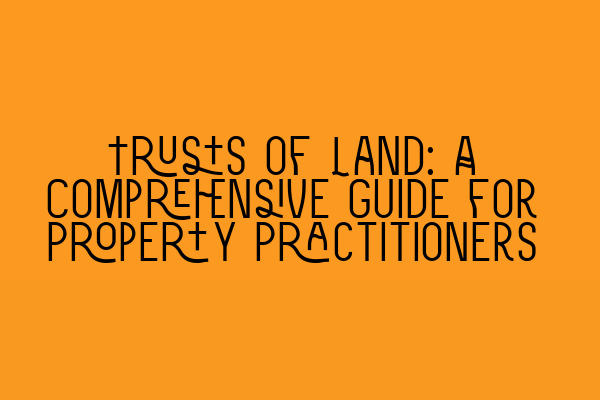Trusts of Land: A Comprehensive Guide for Property Practitioners
Welcome to SQE Property Law & Land Law! As expert solicitors in the field, we understand the complexities and nuances of trusts of land. In this comprehensive guide, we will provide you with all the information you need as a property practitioner. Whether you’re new to the field or looking to brush up on your knowledge, this guide is for you. So, let’s dive in!
What is a Trust of Land?
A trust of land is a legal arrangement where one individual (the trustee) holds the legal title to a property on behalf of another individual or multiple individuals (the beneficiaries). The trustee has a fiduciary duty to manage the property in the best interests of the beneficiaries.
There are various types of trusts of land, including express trusts and implied trusts. Express trusts are created through a formal written document, such as a trust deed. Implied trusts, on the other hand, arise when the circumstances of a particular situation imply that a trust has been created. Understanding the intricacies of these trusts is crucial for property practitioners.
Key Elements of a Trust of Land
To fully understand trusts of land, let’s break down the key elements involved:
1. Legal Title: The trustee holds the legal title to the property and is responsible for its management.
2. Beneficial Interest: The beneficiaries have a beneficial interest in the property. This means they have certain rights, such as the right to occupy, receive income from, or sell the property.
3. Trustee’s Duty: The trustee has a duty to act in the best interests of the beneficiaries and manage the property responsibly.
4. Trustee’s Powers: The trustee may have specific powers outlined in the trust deed or granted by law. These powers allow them to make decisions regarding the property, such as selling it or entering into leases.
Types of Trusts of Land
Now, let’s explore some specific types of trusts of land that property practitioners often encounter:
1. Bare Trusts: In a bare trust, the trustee holds the property for the beneficiaries but has no discretion in its management. They must follow the beneficiaries’ instructions.
2. Resulting Trusts: Resulting trusts arise when a property is purchased jointly, but the legal title is held by only one of the purchasers. The non-legal owner is deemed to hold a resulting trust in their favor.
3. Constructive Trusts: Constructive trusts are created by a court to prevent unjust enrichment. They arise when one party holds property for the benefit of another party, even though they may not have a legal obligation to do so.
4. Family Trusts: Family trusts, also known as settlement trusts, are established for the benefit of family members. They are often used for estate planning and asset protection.
Challenges and Disputes
Trusts of land are not without their challenges and disputes. Property practitioners may encounter various issues, including disagreements among beneficiaries, disputes over the interpretation of trust provisions, or claims of breach of trustee’s duties.
Resolving these disputes requires a deep understanding of trust law and the ability to navigate complex legal processes. As property practitioners, it is essential to stay updated on recent case law and legal reforms in this area.
In conclusion, trusts of land are a crucial aspect of property law, and as property practitioners, it is essential to have a comprehensive understanding of their intricacies. Whether dealing with express trusts, implied trusts, or specific types of trusts like bare trusts or resulting trusts, having a firm grasp of the legal principles and obligations involved is vital.
If you want to further enhance your knowledge and understanding of related legal topics, don’t forget to check out our related articles:
– Understanding Contractual Capacity: Rights and Limitations
– Interactive SQE Mock Tests for Contract Law: Test Your Knowledge
– Join Our SQE Contract Law Webinars: Expert Insights and Guidance
– Contract Law Reforms: An Analysis of Recent Changes
– Parties in a Contract: Rights and Responsibilities
Our team at SQE Property Law & Land Law is dedicated to providing expert legal services in trusts of land and other property-related matters. Whether you need advice, assistance with a dispute, or guidance on structuring a trust, our solicitors are here to help. Contact us today to discuss your needs and benefit from our specialized knowledge and experience.
